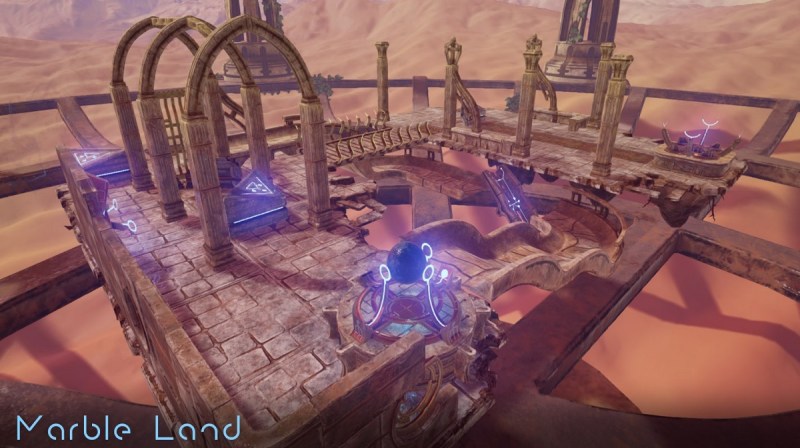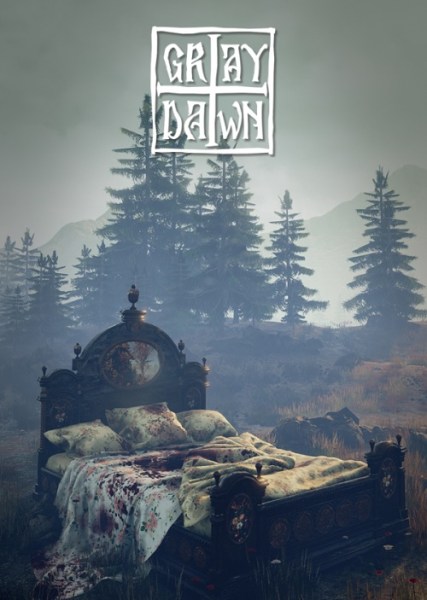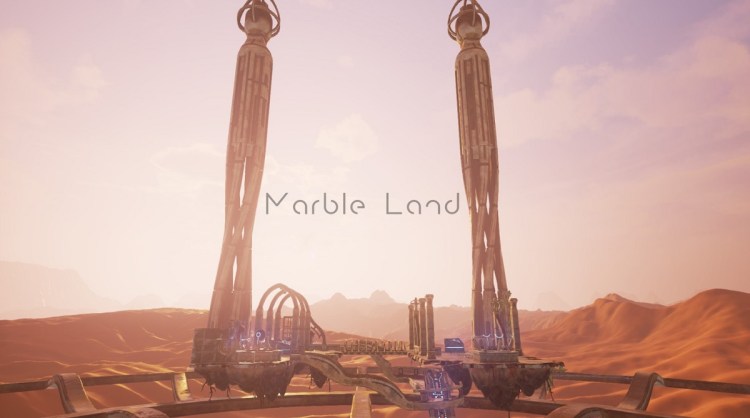Gaming has gone global, and Carbon wants to make it even more so. The Romanian company wants to help small game developers get off the ground by serving as a “micropublisher,” or one that deals with very small but talented game developers.
Carbon’s vision is to enrich the global game industry with new sources of talent and creativity, as a way to counter the rise of mobile gaming’s monolithic giants such as Supercell, King, Niantic, and MZ in the West as well as Tencent, NetEase, and Netmarble in the East.
“We witnessed a Cambrian extinction event among indie game studios,” said Mihai Pohontu, CEO of Amber, a game agency and outsourcing services firm that spun out Carbon as a separate company. He is also a board member and shareholder at Carbon.

Above: Marble Land is a physics-based VR title.
Carbon will focus on Easter Europe at first, but it isn’t in focusing on emerging markets, as Altered Ventures also announced a plan to invest in game projects in emerging markets. Both are social ventures in a way, but they’re also focused on making money.
“Carbon provides an array of services to make products competitive and attractive to Western publishers,” Pohontu said. “We are an intermediary between developers and established publishers.”
Pohontu said that publishers retreated from the classical model of publishing games made by others in favor of publishing their own games. They drastically cut back on product slates and focused on operating highly profitable games-as-a-service products. They focus on evergreen franchises based on proven titles, minimizing creative risks. In other words, the same thing that happened in consoles is happening in mobile, with the top games commanding most of the revenue.
Less capital went into external development, and developers found it near impossible to stand out in the main distribution channels and digital stores. Small developers were crowded out as marketing costs exploded on the channels. Those who can spend to sustain an app’s long life succeed.
Meanwhile, indie studios retreated to the PC platform, or entered survival mode, shedding staff in order to arrive at a more manageable, cost-conscious size. There are dazzling indie successes, from Ustwo’s Monument Valley to Ninja Theory’s Hellblade.
Pohontu said that the battering of indie studios was felt even more sharply in emerging markets. Outside of the major game development centers, indie studios in emerging territories such as Eastern Europe, Latin America, Middle East and Southeast Asia were bereft of publishing support, access to venture capital, and incubation or simply general business know-how.
These indies are often placed in the most precarious position in the industry, even though they have lots to contribute and may even afford the medium a new perspective, a new stylistic presence and a new threshold of originality, as they mine into the history and traditions of their native countries to create fresh new games, he said.

Above: Gray Dawn is an indie horror game that debuts on Steam in the second quarter of 2018.
Carbon was founded in Bucharest, Romania in 2016 with the purpose of addressing this imbalance in the global industry. The city hosts one of the most mature game dev locations in the region, with a history harking back to the founding of Ubisoft Romania in 1991, or the creation of the first Romanian-developed game in 1971. Yet Carbon will look well beyond its local market and seek to support indie studios across the region.
From inception, Carbon was conceived as a socially-minded enterprise and it benefited from a strategic partnership and investment from Amber, which is Romania’s largest independent games company. Amber has about 220 people, while Carbon has four.
Since 2016, Carbon has invested in five products, including three that have already launched. The first
one was a self-published artsy puzzle game called Link Twin, which won the Silver Award at Pocket Gamer’s Big Indie Pitch in London.
Link Twin was developed by a Bucharest studio called Lorraine and launched on iOS and Android in February 2017. It was followed by Tap Busters, a title developed by Metagame, which signed with the US publisher Tilting Point and launched worldwide on November 2017. Carbon’s last launch was a self-published VR game developed by Devious Technologies called Marble Land, which launched on Oculus Rift and HTC Vive in December 2017
“Carbon was our most important partner during the development of Marble Land, our first VR game, and one without which none of it would have been possible,” said George Tudor, of general manager of Devious Technologies, in a statement. “They were always willing to offer help with what we needed, be it hardware, mentorship, logistics and more. I am a big fan and highly recommend their services.”
In 2018, Carbon aims to launch the multiplayer player-versus-player game Rumble Heroes, a free-to-play title developed by Lorraine. It will also release Gray Dawn, a PC horror adventure game from Interactive Stone.
Carbon also just signed a new tactical strategy PC game from the Tel Aviv indie studio Fort Triumph. And Carbon helped connect Tap Busters developers with Tilting Point, a New York mobile game publisher.
Carbon has three tiers of service. The first tier is akin to a classic incubator, offering a cool creative work space (only in Bucharest currently, but planning to expand to other cities as well) and additionally, legal, financial and business consulting to steer the developers to the best opportunities in the games space.
The second tier adds development services delivered by Amber. It also funds industry event participation, PR/pre-launch marketing and intermediation with publishers and distributors. The third tier
provides development and marketing funding, up to $50,000 per project.
In all cases Carbon doesn’t take equity from the studio and only asks for a reasonable revenue share from the product developed by indies, ranging from 10 percent to 30 percent of the net revenue.
“I welcome the recent emergence of boutique publishers and believe a dev support partner like Carbon can play an industry-defining role alongside them” said Catalin Butnariu, Carbon’s general manager, in a statement.
Carbon’s initial investors were also shareholders in Amber. Pohontu said that Carbon is seeking to raise additional capital.
“They saw a lot of very small indie studios in Eastern Europe, trying tomake mobile or PC games with meager resources or no understanding of how the game industry works,” Pohontu said.
It makes more sense to fund indie studios on a project basis, as the founders are often like rock bands and they’re likely to release a good album and then split up.
Pohontu said that Carbon has already reviewed more than 200 submissions, and it has not been able to sign all the ones that it wanted to fund.
“For Carbon to succeed, we need a vastly diversified approach,” he said. “We want to help teams reach their true potential.”

